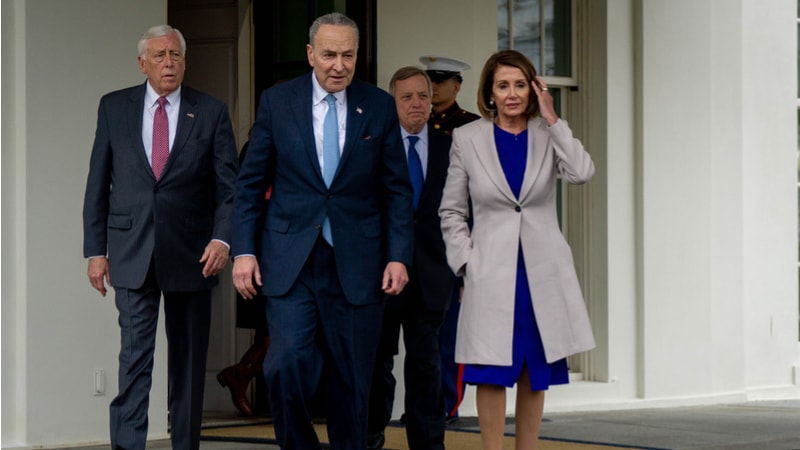
As big tech CEOs descend on Washington for Senate Majority Leader Chuck Schumer’s, D-N.Y., first AI insight forum on Wednesday, the heads of the Senate AI Caucus previewed the closed-door meeting and discussed efforts to regulate the rapidly evolving technology on Sept. 12.
Sens. Martin Heinrich, D-N.M., and Mike Rounds, R-S.D., said during a Washington Post Live event today that the AI insight forum will be used to get information from those working with AI to members of Congress – with a goal of laying the foundation for bipartisan legislation on the fast-moving technology.
“We all recognize that in this kind of a divided Congress, if we’re going to legislate effectively on AI, it really has to be a bipartisan team effort,” Sen. Heinrich said. “It’s an effort to make sure that our colleagues are getting information directly from some of these leaders.”
“We want to make sure that all of the folks who have a seat at the table, who have a stake in this, are heard by our colleagues and that we have the best possible information to be able to legislate in the space,” Sen. Heinrich said.
Sen. Schumer announced the AI insight forums earlier this summer, noting that he will begin inviting “the best of the best” to convene in one room to do “years of work in just months.”
“If we take the typical path – holding congressional hearings with opening statements and each member asking questions five minutes at a time on different issues – we simply won’t be able to come up with the right policies,” Sen. Schumer said when he announced the forums in June. “By the time we act, AI will have evolved into something new. This will not do. A new approach is required.”
The senator explained that the insight forums will not replace congressional committee hearings on AI but will happen alongside them so that the legislative body can push out policies on the technology within a matter of months rather than years.
The first forum will be held behind closed doors tomorrow, featuring a dozen leaders from the country’s most powerful tech companies, including X’s Elon Musk, Meta’s Mark Zuckerberg, Google’s Sundar Pichai, and OpenAI’s Sam Altman, plus other AI bigwigs.
Sens. Heinrich and Rounds will lead the forum discussion, alongside Sen. Schumer and Sen. Todd Young, R-Ind. The leaders are encouraging all senators and their staff to attend the forum, but they won’t be allowed to make remarks or ask questions.
“It’s really a matter of trying to get out as much information for everybody as we possibly can,” Sen. Rounds said during the Washington Post Live event today. “It’s a matter of trying to get as many members as possible and to keep their interest during this time period.”
“So we’re really changing the format around a little bit to try to get these folks to share as much information as they can in the short period of time that they think these decision makers might be interested in hearing,” Sen. Rounds said.
The Republican senator explained that future forums will not only feature top AI executives, but other voices like those of screenwriters and teachers as well.
“I don’t think there’s anything wrong with getting as much information as possible for people that have been making their living and working on AI,” Sen. Rounds said. “But it’s not just the top AI execs that we’ve got coming in. We’ve got folks from the screenwriters guild, we’ve got folks from the teachers union.”
“So we’re trying to get this as broad based as possible, but it’ll never be perfect,” he continued, adding, “But at least we’ll try to get as much new information as possible in a bipartisan way out to as many people as possible and doing it behind closed doors means that maybe some of these folks might be a little bit more candid than what they would be if it was all open and available.”
Sen. Heinrich said that as Congress speeds towards passing AI guardrails this session, he doesn’t foresee anything coming to fruition by the end of this year. The senator does hope that a package will be passed next year, though.
“One of the questions that I’m asking myself is, what’s the threshold at which you begin to regulate something? There are going to be applications for AI that are very low risk, and we don’t want to stifle innovation, but there are also going to be applications that that have very real-world consequences,” Sen. Heinrich said. “If you’re going to have a platform that is going to drive a car or be in charge of a physical system, we need to understand the risks involved there, and we need to be able to test those products and know with a great deal of certainty how they’re going to behave.”
He added, “Understanding how we set those thresholds is going to be a fundamental question that I’m trying to get at.”
